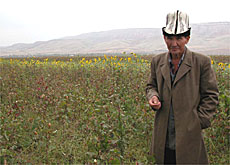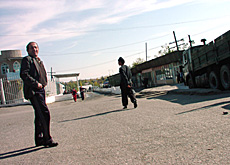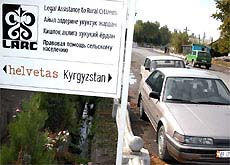Kyrgyzstan’s organic cotton revolution

Switzerland is helping farmers in southern Kyrgyzstan by promoting the production of organic cotton.
In turn, Swiss companies have been asked to purchase Kyrgyzstan’s “bio-cotton” to help farmers fund their transition.
“Finally, I feel like a real farmer,” Kurbashev Mirzaakim told swissinfo.
A former army officer who was given a plot of land by the Kyrgyzstan government when it privatised the country’s collective farms in 1996, Mirzaakim spent the summer learning about organic cotton production.
Along with around 20 other participants, he completed a course run by Swiss agronomists.
“Once upon a time I used to just copy whatever my neighbour was doing. When he irrigated, so did I, and when he picked the cotton, that’s what I did,” Mirzaakim said.
Jens Engeli, a Swiss agronomist based in the southern city of Jalal Abad, said that many Kyrgyz farmers were still learning the basics of agriculture.
“With the land privatisations of 1996, workers on the collective farms were suddenly made independent farmers,” Engeli said.
“The problem was that workers previously were employed as mechanics or something specific and only the [collective farm] agronomist had the overall agricultural knowledge,” he said.
Engeli works for the Swiss charity, Helvetas, which is being financed by the Swiss Development Agency and the World Bank for its work in Kyrgyzstan.
Learning to love compost
The organic farmers’ school is designed to teach farmers how to understand their crops better, making them aware of subtle changes in the plant and how to respond to potential problems, such as pests.
“The school taught us to look at cotton plants closely,” said one 27-year-old farmer.
“Before, we only looked at the field from the edge,” he added.
He said his first attempts at organic farming had been a success, although he had only produced as much cotton as his neighbour, who used traditional methods.
“But I saved money, because I didn’t need to buy any chemical fertilizers or pesticides,” he added.
Engeli said for most Kyrgyz farmers, getting hold of chemical fertilizers was unaffordable. One alternative is the creation of compost, which the Helvetas project encourages.
Potential
Helvetas has also pushed farmers to adopt crop rotation to help the soil recover.
“Naturally, planting different crops means there is less cotton,” Engeli said. “But that means farmers also have food for their own consumption.”
Kyrgyzstan’s organic cotton production is unlikely to reach markets for another two years, largely because organic certification – to European standards – takes at least three years.
Organisers of the Jalal Abad project hope to help at least 300 farmers convert to organic production within that period.
“Many farmers are very interested in the programme,” said Janibek Osmonaliev, the vice governor of Jalal Abad’s local authority.
“Organic cotton definitely has potential,” he added. “And if there is a demand for organic cotton, we will definitely fill it.”
Most of that demand is expected to come from wealthy countries such as Switzerland, where a handful of importers have expressed an interest in the organic product – even though it remains more expensive than regular cotton because of short-term losses associated with conversion.
Lacklustre response
Currently, the only Swiss company that has confirmed its interest is the Winterthur-based textiles group, Paul Reinhart.
“We have been trading organic cotton for 13 years,” said Ulrich Siegrist, a company spokesman.
“But its overall share on the global market remains very marginal,” he added.
For Reinhart, organic cotton remains a loss-making business.
“But we see the value of such a project for both farmers and the environment, and that’s why we’re involved,” he added.
Reinhart already buys organic cotton from Mali, in West Africa. Similarly the supermarket giant Migros as well as the Swiss clothing manufacturer, Switcher, source organic cotton from Africa.
However, both firms have decided not to support the Kyrgyzstan project.
“We don’t want to buy organic cotton from all over the world, and then have to ship it half way around the world to our processing [plants],” said Daniel Ruefenacht, a spokesman for Switcher.
However Tobias Meier, a spokesman for Helvetas in Zurich, said he was confident the cotton would be sold.
“Even Nike and other big firms are interested in organic cotton,” Meier said.
That is undoubtedly good news for the farmers in Kyrgyzstan.
“We hope that many Swiss will buy our organic cotton,” one farmer told swissinfo.
swissinfo, Philippe Kropf and Jacob Greber in Jalal Abad
In 1996, the government of Kyrgyzstan privatised the country’s collective farms; overnight, thousands of people became farmers in their own right.
Helvetas helps train farmers in organic techniques.
It hopes to convert some 300 farmers to organic production. They are expected to produce some 400 tonnes of organic cotton per year.
The cotton is then due to be sold in Switzerland.
Swiss companies have been asked to guarantee Kyrgyz farmers higher prices to help off-set the cost of shifting from fertilizer and pesticide-based farming.
The Jalal Abad region – which straddles the fertile Fergana Valley – produces around 70% of Kyrgyzstan’s cotton.

In compliance with the JTI standards
More: SWI swissinfo.ch certified by the Journalism Trust Initiative










You can find an overview of ongoing debates with our journalists here . Please join us!
If you want to start a conversation about a topic raised in this article or want to report factual errors, email us at english@swissinfo.ch.